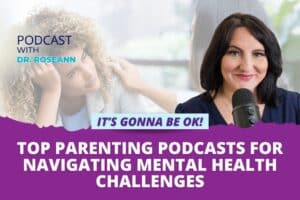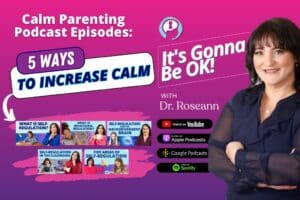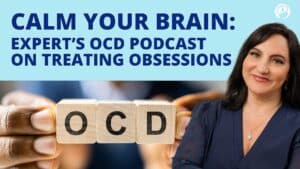In the fast-paced world we live in today, anxiety can pose a significant challenge to children and teens, often leaving their parents feeling overwhelmed. The ripple effects of mental health and behavioral hurdles on day-to-day living can be astonishingly profound.
For this reason, many parents continuously search for effective strategies that could enhance their children's mental resilience and overall wellness, something most of us can surely relate to. One such solution that has gained attention is magnesium.
There are many health benefits of magnesium for the brain. Magnesium supplementation can support attention, mood, stress, and behavior. There are several forms of magnesium; some are better for the anxious brain.
I remember a child named Carl who struggled with overwhelming anxiety. For him, every day felt like a battle with worry. Anxious thoughts swirled in his mind, and he constantly felt uneasy. Carl's parents are determined to help Carl find relief that won't harm his developing brain. So, they embarked on a journey to explore natural solutions.
That's how they stumbled upon me and the remarkable benefits of magnesium in supporting brain health and managing anxiety levels. Intrigued by the promising stories they heard, they decided to try our BrainBehaviorResetTM Program. In our program we supported his brain with magnesium and other supplements that calmed his brain.
Understanding Anxiety and Its Causes
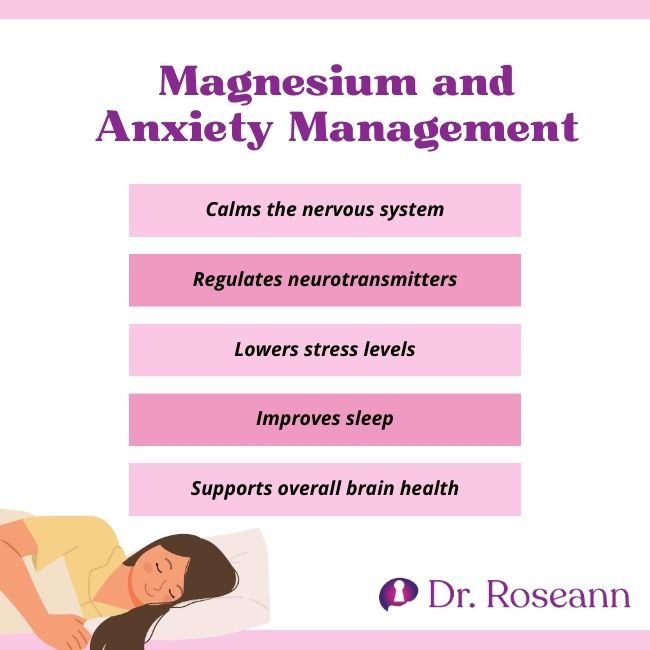
Anxiety is like a tricky troublemaker that disrupts our lives, even that of our children and teenagers. It's a mental health disorder that comes in various forms. There's the well-known generalized anxiety disorder (GAD), social anxiety, panic disorder, specific phobias, and more.
The cause of anxiety is a mix of genetics, environment, and brain chemistry (Schiele & Domschke, 2017). Anxiety affects the neurotransmitters responsible for relaying messages between nerve cells. Sometimes, these messengers become overly enthusiastic or sluggish, causing an imbalance that can lead to anxiety.
Now let's focus on the brain, the organ responsible for processing our hopes, fears, and other emotions and mental processes. The amygdala is a small almond-shaped structure located in the limbic system. It is always on the lookout for potential dangers. It is quick to sound the alarm in the event of any danger.
The amygdala diligently assesses incoming sensory information for signs of danger. As a result, it is a critical player in our primitive fight-or-flight response. It prepares us to react swiftly in the face of perceived threats.
When the amygdala perceives a potential danger, it creates a cascade of physiological and psychological responses. It triggers the release of stress hormones and prepares the body to confront or evade the perceived threat.
While this automatic response is an invaluable survival mechanism, the amygdala can become overzealous in anxiety disorders. It perceives danger where there is none or magnifies potential threats beyond proportion. In addition, this hyperactive amygdala response can lead to heightened anxiety, where everyday situations trigger intense fear and apprehension.
Herein lies the fascinating connection between magnesium and anxiety. Magnesium, in its multifaceted role, can modulate the amygdala's activity and restore a sense of equilibrium (Portnoy et al., 2021). It interacts with neurotransmitters and receptors in the brain, influencing their function and promoting a state of calmness and tranquility.
To combat magnesium deficiency, certain food sources are recommended. Foods rich in magnesium include green leafy vegetables, potatoes, bananas, and almonds. Some people may need supplements to have enough magnesium in their bodies.
Understanding Magnesium's Impact on Anxiety Management
Magnesium is not just the unsung hero in the battle against anxiety. It is also vital in supporting our mental well-being. First and foremost, magnesium has a calming effect on the nervous system. It helps soothe frazzled nerves to help ease anxiety symptoms. It acts as a natural relaxant, promoting a sense of tranquility and peacefulness.
But that's not all. Magnesium also plays a vital role in regulating neurotransmitters, the brain's chemical messengers. It helps maintain the delicate balance of these neurotransmitters, including serotonin, often called the “happy hormone.” When serotonin levels are in harmony, it can contribute to a more stable and positive mood and reduce anxiety.
Another significant aspect of magnesium is its ability to support stress management. In our fast-paced, modern lives, stress is an all-too-familiar companion. Magnesium helps regulate the stress response in the body, ensuring that it doesn't spiral out of control. It can also help prevent anxiety from reaching overwhelming heights by keeping stress in check.
Moreover, this mineral promotes restful sleep. We all know the power of a good night's sleep in combating anxiety. Magnesium is a natural sleep aid that helps relax the body and mind. It enhances the production of a neurotransmitter called gamma-aminobutyric acid (GABA). GABA has a calming effect and encourages a peaceful slumber (Moykkynen et al., 2001).
In addition to its direct impact on anxiety, magnesium supports overall brain health. It contributes to the proper functioning of brain cells, ensuring that our cognitive faculties are in top shape. A well-nourished brain is better equipped to handle the challenges and stresses that come our way. It minimizes the likelihood of anxiety taking hold.
Carl began taking magnesium supplements with my recommendation and guidance from a healthcare professional. We also did neurofeedback training and PEMF therapy. Slowly but surely, his parents started noticing subtle changes within his young mind. The grip of anxiety began to loosen, and a newfound sense of calm emerged.
Carl's anxiety diminished as the days turned into weeks. A newfound sense of serenity replaced his anxiety. Sleep became more effortless, and his world felt a lot brighter. The cloud of worry that once shrouded his thought was gradually dissipating.
Best Forms of Magnesium for Anxiety
When it comes to magnesium, not all forms are created equal. There are different types of magnesium that you can use as a supplement.
- Magnesium Glycinate
One of the top contenders in the magnesium realm is magnesium glycinate. This form boasts high bioavailability, meaning it's easily absorbed and utilized by the body. Magnesium glycinate is also gentle on the stomach.
It's an excellent choice for those who may experience digestive sensitivity. It acts like a smooth and soothing balm for both body and mind, supporting relaxation and helping to alleviate anxiety symptoms.
2. Magnesium Citrate
Magnesium citrate is known for its efficient absorption and bioavailability. It also has a mild laxative effect, benefiting individuals struggling with constipation. In addition, it gently supports anxiety while ensuring digestive regularity.
3. Magnesium Malate
Magnesium malate combines magnesium with malic acid. Malic acid is a compound naturally found in fruits and contributes to energy production in the body. Magnesium malate offers the dual benefit of supporting anxiety relief while providing an energy boost.
4. Magnesium L-threonate
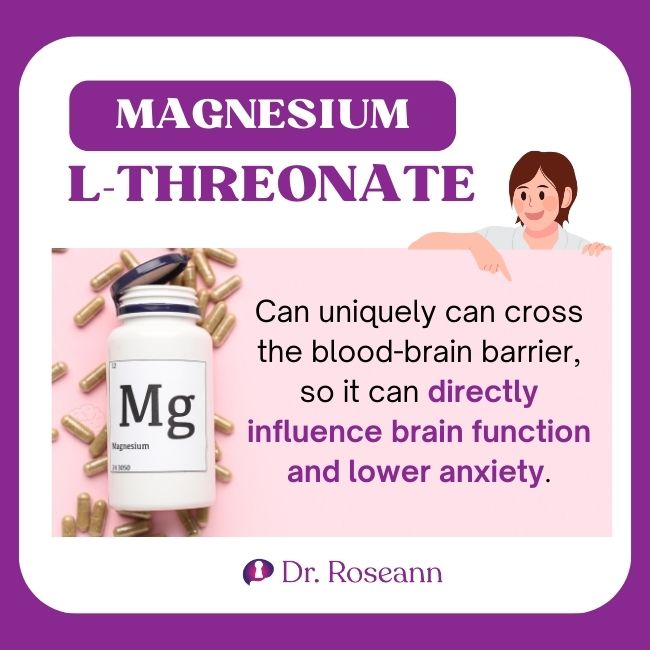
For those seeking an extra dose of brain-boosting power, magnesium l-threonate may be the answer. This form uniquely can cross the blood-brain barrier, which means it can directly influence brain function. As it enhances magnesium levels in the brain, magnesium l-threonate supports cognitive function.
It also provides additional benefits in managing anxiety and is one of my favorite forms of magnesium for all clinical mental health issues.
5. Magnesium Oxide
Now, let's not forget about good old magnesium oxide. While it may not have the same high bioavailability as other forms, it still deserves a place in our magnesium arsenal. Magnesium oxide is often cost-effective and widely available, making it accessible to many. It can be suitable for individuals with normal digestion who want to maintain adequate magnesium levels.
Dosage and Timing for Anxiety Magnesium Supplements
Now that we've uncovered the diverse array of magnesium forms, it's time to shed light on an equally important aspect. What's the right dosage and timing for magnesium supplements? Determining the appropriate dosage of magnesium depends on various factors, including age, sex, and overall health. It is also important to include the specific condition you aim to address.
Adult males' recommended daily allowance (RDA) ranges from 320 to 420 mg of magnesium. For females, it's 270 to 320 mg.
Children ages 7 to 10 years need 100 to 135 mg per day. Those who are 4 to 6 years old only require 65 mg per day. Children from birth to 3 years need about 20 to 50 mg per day. Teens benefit from magnesium as well and need 280 to 410 depending on their gender.
RDA Magnesium Recommendations for Children and Adults
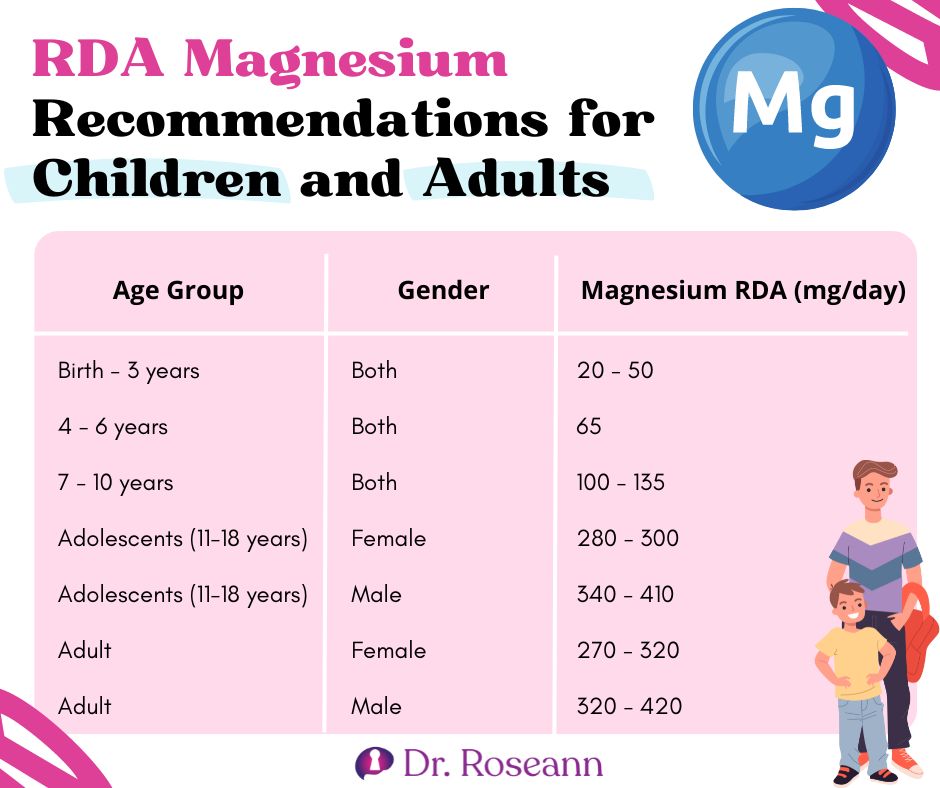
However, remember that these are general guidelines, and individual requirements may vary. Your healthcare professional will help determine the optimal dosage that aligns with your unique needs.
Regarding timing, magnesium supplements can be taken at any time of the day. However, some people find it beneficial to divide their dosage throughout the day to ensure a steady supply of magnesium. Splitting the dosage into two or three smaller portions can help maintain consistent levels in the body. Doing this allows for a more sustained effect.
Consider taking magnesium supplements with meals to enhance absorption and minimize the risk of gastrointestinal discomfort. Note that some forms may have a laxative effect like magnesium citrate.
But also be mindful of magnesium's potential interactions. Doing this is essential when taking other medications or supplements. Some medicines may interfere with the absorption or effectiveness of magnesium. It's crucial to inform your healthcare professional about all the substances you're taking to ensure they work harmoniously together.
Magnesium supplements make it easier to manage anxiety and support overall well-being. However, they should not be considered a standalone solution. They work best with a holistic approach to mental health. It's best to include a healthy diet, regular exercise, better sleep, stress management techniques, and professional guidance from mental health experts.
Can Excess Magnesium Make Anxiety Worse?
Magnesium is widely recognized for its potential benefits in managing anxiety. But addressing a common concern is also essential: Can it worsen anxiety? Let's explore this question and explore the possible factors at play.
Magnesium is considered safe for most individuals when taken within the recommended dosage range. However, in some cases, specific individuals may experience some side effects of magnesium supplementation. Others say they experience heightened anxiety symptoms when supplementing with magnesium. Understanding the main factors that could contribute to this response is crucial.
Firstly, dosage plays a significant role. Taking excessively high doses of magnesium supplements can lead to gastrointestinal discomfort and, in some cases, a laxative effect. It may cause digestive disturbances like diarrhea, cramping, and loose stools. Such physical discomfort can be distressing and may indirectly contribute to anxiety or unease.
Additionally, individual sensitivity to magnesium can vary. For example, some individuals may be more sensitive to mineral-level changes. Some may have specific conditions that interact with magnesium metabolism.
These factors can influence how their bodies respond to magnesium supplementation, potentially exacerbating anxiety symptoms. However, it's important to note that individual reactions to magnesium can vary. What may trigger anxiety in one person may not affect another.
Another consideration is the potential interaction between magnesium and certain medications. For example, some medications, such as antibiotics and diuretics, can affect magnesium levels in the body. If your child takes a prescription medication, consult a healthcare professional first. Doing so will ensure their supplemental magnesium won't interfere with their effectiveness or cause adverse reactions.
It's also worth noting that anxiety can stem from various underlying causes, and magnesium may not address all of them. Magnesium can help promote relaxation and support the nervous system. But again, it's not a magic solution for all forms of anxiety. You may need other holistic solutions for your child.
If you experience increased anxiety symptoms or discomfort after starting magnesium supplementation, seek guidance from a healthcare professional. They can help evaluate whether magnesium is the cause or if there are other factors at play.
Your doctor will also recommend adjusting the dosage. They may also try a different form of magnesium or explore alternative approaches to support your child's mental well-being.
Magnesium and Other Nutrients for Anxiety
When managing anxiety, natural supplements offer a treasure trove of possibilities. While magnesium takes center stage as a renowned anxiety-relieving powerhouse, several other dietary supplements and therapeutic modalities are worth exploring.
Magnesium is still the star of the show, though. This essential mineral is vital in numerous bodily functions, including brain health and stress management. By supporting neurotransmitter balance and modulating the stress response, magnesium can alleviate anxiety symptoms and promote a sense of calm. Here are a few other natural solutions that can help:
1. L-Theanine
Derived from green tea leaves, L-theanine is an amino acid renowned for its ability to induce relaxation without causing drowsiness. Increasing alpha brain waves promotes a state of alert calmness, making it a fantastic ally in the battle against anxiety.
2. Ashwagandha
This adaptogenic herb has been used in Ayurvedic medicine for centuries. Ashwagandha helps the body adapt to stress by modulating the stress response system. Promoting relaxation, improving sleep quality, and enhancing overall well-being offers a comprehensive approach to anxiety management.
3. Passionflower
Passionflower has long been revered for its positive effects on the body, particularly calming the nerves. It also helps increase the levels of GABA receptors in the body to promote relaxation and alleviate anxiety symptoms. So it's a natural choice for those seeking serenity.
4. Vitamin D
Not just for strong bones, vitamin D also plays an important role in regulating brain function and mood swings. Low vitamin D levels have been associated with increased anxiety and depression risk. Adequate sunlight exposure and supplementation help maintain optimal levels and support a more balanced mind.
5. Omega-3 Fatty Acids
In fatty fish like salmon and mackerel, omega-3 fatty acids benefit cardiovascular health and anxiety management. These essential fats support brain health, reduce inflammation, and promote a healthy nervous system.
6. Neurofeedback
Neurofeedback is a non-invasive technique that utilizes real-time feedback to train the brain to regulate its activity more effectively. By targeting specific brainwave patterns associated with anxiety, neurofeedback can help rewire the brain, promoting a calmer state of mind.
7. Pulsed Electromagnetic Field (PEMF) Therapy
PEMF therapy uses electromagnetic fields to stimulate the body's natural healing and regulatory processes. It can help reduce anxiety by promoting relaxation, improving sleep quality, and rebalancing brain activity.
Regular magnesium supplementation, neurofeedback, and PEMF under our BrainBehaviorResetTM Program worked wonders. Carl's transformation was visible to his parents and those around them. His teachers noticed a greater ability to focus in class, and his friends marveled at his newfound confidence. Carl's laughter returned, and it filled their home with joy.
Carl is a shining example of how effective magnesium supplements are. It can make a profound difference in the lives of those struggling with anxiety. He has found his inner strength and has become an inspiration to others facing similar challenges.
Remember, anxiety is not a sign of weakness or a character flaw. It's more like a little glitch in the marvelous machinery called the human brain. So seeking help from mental health providers is a smart move.
But parents aren't just spectators in this journey. They can start by creating a nurturing and loving environment for your anxious kids and teens. Talk openly about their feelings and create safe spaces to share their worries. Assure your child that you'll catch them when they stumble even if it is at school. There are always ways to get extra support at school too.
Then, of course, share a few lighthearted moments along the way because laughter can work wonders! If you feel that you need to do more for your child’s anxiety, then consider the benefits of magnesium for them and you. You can get on our waitlist for Neurotastic™ Multi-Mag Brain™ Formula for special offers and discounts.
Parent Action Steps
- Find the right magnesium for your child or yourself and consult with your provider
- Determine the appropriate dosage and timing when giving the supplement
- Include a healthy diet, regular exercise, and adequate sleep
- Get on our Neurotastic™ Multi-Mag Brain™ Formula waitlist to get special discounts
Citations:
Moykkynen, T., Uusi-Oukari, M., Heikkilä, J., Lovinger, D. M., Lüddens, H., & Korpi, E. R. (2001). Magnesium potentiation of the function of native and recombinant GABAA receptors. NeuroReport, 12(10), 2175. https://journals.lww.com/neuroreport/Abstract/2001/07200/Magnesium_potentiation_of_the_function_of_native.26.aspx
Portnoy, J., McGouldrick, S. H., Raine, A., Zemel, B. S., Tucker, K. L., & Liu, J. (2021). Lower dietary intake of magnesium is associated with more callous–unemotional traits in children. Nutritional Neuroscience, 1–10. https://doi.org/10.1080/1028415x.2021.1963064
Schiele, M. A., & Domschke, K. (2017). Epigenetics at the crossroads between genes, environment and resilience in anxiety disorders. Genes, Brain and Behavior, 17(3), e12423. https://doi.org/10.1111/gbb.12423
Always remember… “Calm Brain, Happy Family™”
Are you looking for SOLUTIONS for your struggling child or teen?
Dr. Roseann and her team are all about solutions, so you are in the right place!
There are 3 ways to work with Dr. Roseann:
You can get her books for parents and professionals, including: It’s Gonna Be OK™: Proven Ways to Improve Your Child’s Mental Health, Teletherapy Toolkit™ and Brain Under Attack: A Resource For Parents and Caregivers of Children With PANS, PANDAS, and Autoimmune Encephalopathy.
If you are a business or organization that needs proactive guidance to support employee mental health or an organization looking for a brand representative, check out Dr. Roseann’s media page and professional speaking page to see how we can work together.
Dr. Roseann is a Children’s Mental Health Expert and Therapist who has been featured in/on hundreds of media outlets including, CBS, NBC, FOX News, PIX11 NYC, The New York Times, The Washington Post,, Business Insider, USA Today, CNET, Marth Stewart, and PARENTS. FORBES called her, “A thought leader in children’s mental health.”

She is the founder and director of The Global Institute of Children’s Mental Health and Dr. Roseann Capanna-Hodge. Dr. Roseann is a Board Certified Neurofeedback (BCN) Practitioner, a Board Member of the Northeast Region Biofeedback Society (NRBS), Certified Integrative Medicine Mental Health Provider (CMHIMP) and an Amen Clinic Certified Brain Health Coach. She is also a member of The International Lyme Disease and Associated Disease Society (ILADS), The American Psychological Association (APA), Anxiety and Depression Association of America (ADAA) National Association of School Psychologists (NASP), International OCD Foundation (IOCDF) International Society for Neurofeedback and Research (ISNR) and The Association of Applied Psychophysiology and Biofeedback (AAPB).
© Roseann-Capanna-Hodge, LLC 2023
Disclaimer: This article is not intended to give health advice and it is recommended to consult with a physician before beginning any new wellness regime. *The effectiveness of diagnosis and treatment vary by patient and condition. Dr. Roseann Capanna-Hodge, LLC does not guarantee certain results.






